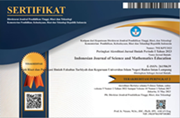Learning Obstacle in the Introduction to Number: A Critical Study Within Didactical Design Research Framework
Abstract
Keywords
Full Text:
PDFReferences
D. Suryadi, Landasan filosofis penelitian Desain Didaktis (DDR). Bandung: Gapura Press, 2019.
A. Sarah, “Peran Guru PAK Sebagai Fasilitator Dalam Pelaksanaan Pembelajaran Literasi,” Fidei J. Teol. Sist. dan Prakt., vol. I, no. 2, pp. 232–249, 2018.
S. Sudirman et al., “Praktik Penilaian Guru Pendidikan Sains antara Keyakinan atau Pengetahuan Guru? Perspektif Filsafat,” J. Ilm. Profesi Pendidik., vol. VII, no. 3, pp. 2018–2025, 2022.
L. D. Pratama and W. Lestari, “Pengaruh Pelatihan Terhadap Kompetensi Pedagogik Guru Matematika,” J. Cendekia J. Pendidik. Mat., vol. IV, no. 1, pp. 278–285, 2020.
I. P. Suardipa, “Sociocultural-Revolution Ala Vygotsky dalam Konteks Pembelajaran,” Widya Kumara J. Pendidik. Anak Usia Dini, vol. I, no. 2, pp. 48–58, 2020.
H. Budiono and A. Utomo, “Strategi Guru dalam Mengembangkan Keterampilan Berpikir Kritis (Critical Thinking) pada Pembelajaran Tematik Terpadu Kelas V Sekolah Dasar,” ADI WIDYA, J. Pendidik. Dasar, vol. V, no. 2, pp. 1–5, 2020.
D. K. Yestiani and N. Zahwa, “Peran Guru dalam Pembelajaran pada Siswa Sekolah Dasar,” Fondatia, vol. IV, no. 1, pp. 41–47, 2020.
H. Karso, Pembelajaran Matematika di SD. Jakarta: Universitas Terbuka, 2014.
E. Kosasih, Pengembangan Bahan Ajar. Jakarta: Bumi Aksara, 2021.
D. Suryadi, Penelitian Desain Didaktis (DDR) dan implementasinya. Bandung: Gapura Press, 2019.
Y. Chevallard and M. Bosch, Didactic Transposition in Mathematics Education. Encyclopedia of Mathematics Education. London: Springer, Dordrecht, 2014.
J. Boaler and C. Dweck, Mathematical mindsets: unleashing students’ potential through creative math, inspiring messages and innovative teaching. San Francisco: Jossey-Bass, 2016.
I. M. Rusmana, “Konflik Kognitif Dalam Pembelajaran Matematika,” Indones. J. Educ. …, vol. I, no. 1, pp. 9–16, 2021.
I. Pauji et al., “Analysis of Context Utilization in Mathematics Learning Based on Teacher Competency,” vol. IX, no. 1, pp. 37–47, 2023.
A. Hendriyanto, D. Suryadi, J. A. Dahlan, and D. Juandi, “Praxeology review: Comparing Singaporean and Indonesian textbooks in introducing the concept of sets,” Eurasia J. Math. Sci. Technol. Educ., vol. XIX, no. 2, pp. 1-13, 2023.
NCTM, Principles and Standards for School Mathematics. New York : NCTM, 2000.
A. N. Phafiandita, A. Permadani, A. S. Pradani, and M. I. Wahyudi, “Urgensi Evaluasi Pembelajaran di Kelas,” JIRA J. Inov. dan Ris. Akad., vol. III, no. 2, pp. 111–121, 2022.
M. Hariyani, T. Herman, D. Suryadi, and S. Prabawanto, “Exploration of Student Learning Obstacles in Solving Fraction Problems in Elementary School,” Int. J. Educ. Methodol., vol. VIII, no. 3, pp. 505–515, 2022.
I. Fauzi and R. Arini, “Desain Didaktis Penjumlahan dan Pengurangan Pecahan Campuran di Sekolah Dasar,” J. Didakt. Pendidik. Dasar, vol. V, no. 1, pp. 1–30, 2021.
I. Fauzi and D. Suryadi, “Didactical Design Research untuk Mengembangkan Kompetensi Pedagogik Guru di Sekolah Dasar,” Inven. J. Pendidik. Guru Sekol. Dasar, vol. IV, no. 1, pp. 58-68, 2020.
U. Nurjanah and D. L. Hakim, “Number sense siswa pada materi bilangan,” Pros. Semin. Nas. Mat. dan Pendidik. Mat. Sesiomadika 2019, vol. II, no. 1, pp. 1174–1182, 2019.
E. Yayuk, Pembelajaran Matematika SD. Malang: UMM Press, 2019.
A. Siregar, Z. Rahmayani, N. Safira, A. Rahmah, Rahmaida, and H. P. Ritonga, “Penjumlahan, Pengurangan, Pembagian, Perkalian Pada Operasi Bilangan Bulat,” Innov. J. Soc. Sci. Res., vol. III, no. 2, pp. 6248–6259, 2023.
N. Nurjannah, D. Danial, and F. Fitriani, “Diagnostik Kesulitan Belajar Matematika Siswa Sekolah Dasar Pada Materi Operasi Hitung Bilangan Bulat Negatif,” Didakt. J. Kependidikan, vol. XIII, no. 1, pp. 68–79, 2019.
L. A. Nurani et al., “Analisis Learning Obstacle Siswa Pada Materi Pecahan Senilai Di Kelas Iv Sekolah Dasar,” J. Elem. Educ., vol. IV, no. 5, pp. 673-683, 2021.
S. M. Rohmah, D. Darta, and R. I. Anggraeni, “Analisis Learning Obstacles pada Materi Pecahan Siswa Kelas IV Sekolah Dasar,” Symmetry Pas. J. Res. Math. Learn. Educ., vol. VII, no. 2, pp. 171–180, 2022.
S. P. Rukin, Metodologi Penelitian Kualitatif. Takalar: Yayasan Ahmar Cendekia Indonesia, 2019.
A. Giorgi and B. Giorgi, Qualitative Psychology: A Practical Guide to Research Methods. London : SAGE Publications, 2003.
M. I. Daulay and H. Y. Daulay, “Penerapan Pembelajaran Tematik Kelas II Sekolah Dasar,” J. Pendidik. Tambusai, vol. V, no. 1, pp. 272–280, 2021.
G. Brousseau, Theory of Didactical Situations in Mathematics. New York, Boston, Dordrecht, London, Moscow: Kluwer Academic Publishers, 2002.
L. Marinda, “Teori Perkembangan Kognitif Jean Piaget Dan Problematikanya Pada Anak Usia Sekolah Dasar,” An-Nisa’ J. Kaji. Peremp. dan Keislam., vol. XIII, no. 1, pp. 116–152, 2020.
DOI: http://dx.doi.org/10.24042/ijsme.v6i3.19792
Refbacks
- There are currently no refbacks.
Copyright (c) 2023 Unit Riset dan Publikasi Ilmiah FTK UIN Raden Intan Lampung

This work is licensed under a Creative Commons Attribution-ShareAlike 4.0 International License.

Indonesian Journal of Science and Mathematics Education is licensed under a Creative Commons Attribution-ShareAlike 4.0 International License.




